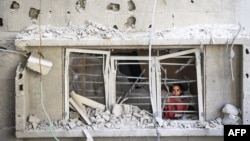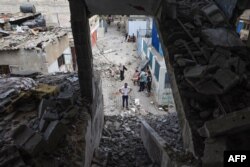Hamas has given its initial approval of a U.S.-backed proposal for a phased cease-fire deal in Gaza, dropping a key demand that Israel commit up front to a complete end to the war, a Hamas official and an Egyptian official said Saturday.
The apparent compromise by the militant group, which controlled Gaza before triggering the war with an October 7 terror attack on Israel, could deliver the first pause in fighting since November and set the stage for further talks on ending a devastating nine months of fighting. But all sides cautioned that a deal is still not guaranteed.
Inside Gaza, the Health Ministry said an Israeli airstrike on a school-turned-shelter killed at least 16 people and wounded at least 50 others in the Nuseirat refugee camp. Children were among the dead and wounded. Israel's military said it was looking into the report.
The two officials, who spoke on condition of anonymity to discuss ongoing negotiations, said Washington's phased deal would start with a "full and complete" six-week cease-fire during which older, sick and female hostages would be released in exchange for hundreds of Palestinian prisoners. During those 42 days, Israeli forces would withdraw from densely populated areas of Gaza and allow the return of displaced people to their homes in northern Gaza, the officials said.
Over that period, Hamas, Israel and mediators would negotiate the terms of the second phase that could see the release of the remaining male hostages, both civilians and soldiers, the officials said. In return, Israel would free additional Palestinian prisoners and detainees. The third phase would include the return of any remaining hostages, including bodies of the dead, and the start of a yearslong reconstruction project.
Hamas still wants written guarantees from mediators that Israel will continue to negotiate a permanent cease-fire deal once the first phase goes into effect, the officials said.
The Hamas representative told The Associated Press the group's approval came after it received "verbal commitments and guarantees" from the mediators that the war won't be resumed and that negotiations will continue until a permanent cease-fire is reached.
"Now we want these guarantees on paper," the representative said.
Both sides wary
Months of on-again off-again cease-fire talks have stumbled over Hamas' demand that any deal include a complete end to the war. Israeli Prime Minister Benjamin Netanyahu has offered to pause the fighting but not end it until Israel reaches its goals of destroying Hamas' military and governing capabilities and returning all hostages held by the militant group.
Hamas has expressed concern that Israel will restart the war after the hostages are released. Israeli officials have said they are worried Hamas will draw out the talks and the initial cease-fire indefinitely without releasing all the hostages.
Netanyahu's office did not respond to requests for comment, and there was no immediate comment from Washington. On Friday, the Israeli prime minister confirmed that the Mossad spy agency's chief had paid a lightning visit to Qatar, a key mediator, but his office said "gaps between the parties" remained.
"For the first time in many months, we feel hopeful," a statement by many families of hostages said. "Netanyahu, we have seen how you repeatedly thwart deals in real time. Don't you dare break our hearts again."
Cease-fire would include aid
Israel launched the war in Gaza after Hamas' October terror attack in which militants stormed into southern Israel, killed some 1,200 people — mostly civilians — and abducted about 250. Israel says Hamas is still holding about 120 hostages — about a third of them now thought to be dead.
Since then, the Israeli air and ground offensive has killed more than 38,000 people in Gaza, according to the territory's Health Ministry, which does not distinguish between combatants and civilians in its count.
The offensive has caused widespread devastation and a humanitarian crisis that has left hundreds of thousands of people on the brink of famine, according to international officials.
The cease-fire deal would see around 600 trucks of humanitarian aid entering Gaza daily, with half of them bound for the enclave's hard-hit north, the two officials said. Since Israel's assault on the southernmost city of Rafah, aid supplies entering Gaza have been reduced to a trickle.
"We want to eat, but from where we can eat? The country is exhausted. The country is destitute. It is not suitable for living," said Walid Hegazi, a resident of the Jabaliya refugee camp in northern Gaza. "We're sorry for the donkeys because we ate their wheat and barley."











